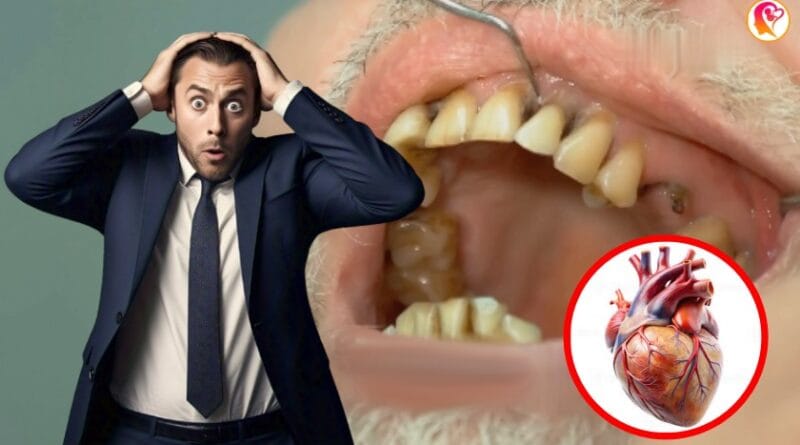🦷💔 The Silent Killer: Could Your Teeth Be Causing Your Heart Attack?
Welcome to our blog! 👋 Have you ever wondered why so many young people are suddenly falling victim to heart attacks? We’re talking about men and women in their 20s and 30s—completely unexpected, completely devastating. While cholesterol has always been blamed as the number one culprit, a groundbreaking study has revealed a hidden cause that might be putting millions at risk… something so overlooked that it might just be in your mouth right now!
Stay with us till the end, because today, we’re going to uncover this shocking secret, explain how it affects your heart, and most importantly, show you how to protect yourself and your loved ones.
🚨 Heart Attacks on the Rise: A Shocking Trend
Heart attacks are now the leading cause of death in India, responsible for one out of every three deaths. But here’s the surprising part—nearly 50% of heart attacks in India occur in people below 50! This isn’t normal. Something is seriously wrong.
Traditionally, doctors have pointed fingers at cholesterol, stress, and poor lifestyle choices. But a new study has turned this understanding upside down. Researchers analyzed 101 heart attack patients and made an unbelievable discovery: nearly 78% of them had a common factor that had nothing to do with cholesterol or high blood pressure.
What was it?
💥 A deadly bacterial infection… originating from their teeth! 💥
🦠 The Mouth-Heart Connection: How Bacteria Attacks
You might be wondering—how can bacteria from the mouth affect the heart? Doesn’t stomach acid kill bacteria before they enter the bloodstream?
Here’s where it gets alarming: If you have untreated dental infections, cavities, or gum disease, bacteria can enter your bloodstream directly through small wounds in your gums. Once inside, these bacteria travel through your arteries and can cause blockages, inflammation, and eventually—heart attacks.
A study by the Mayo Clinic found that people who had undergone dental procedures, like tooth extractions, were at a significantly higher risk of heart complications if they already had heart conditions. The connection is real, and the science behind it is terrifying!
Our mouths naturally contain over 200 species of bacteria—some good, some bad. In a healthy individual, good bacteria keep the harmful ones under control. But when oral hygiene is neglected, harmful bacteria multiply, leading to infections that don’t just stay in the mouth.
The real danger begins when these bacteria create biofilms—thin layers of microbial colonies that stick to your teeth and gums. Once they infiltrate the bloodstream, they can trigger chronic inflammation, blood clot formation, and arterial blockages.
⚠️ Warning Signs: Are You at Risk?
So, what are the symptoms?
- 🩸 Bleeding gums while brushing
- 🤢 Chronic bad breath
- Swollen or receding gums
- 🦷 Tooth sensitivity and pain
If you’ve noticed any of these, you could already be at risk!
Here’s where it gets even scarier. Many people only visit the dentist when the pain becomes unbearable—often requiring tooth extraction. But what they don’t realize is that extracting an infected tooth can release a surge of harmful bacteria into the bloodstream in one shot, dramatically increasing heart attack risks in vulnerable individuals.
Dentists and cardiologists rarely coordinate, which is why so many patients with pre-existing heart conditions face severe complications post-dental surgery.
🛡️ Protect Your Heart: Simple Steps to Take
Now, you may be wondering… if oral bacteria are so dangerous, what can we do to stop them?
The good news? Protecting yourself is easier than you think. Here are the top five steps you need to follow to ensure your oral health doesn’t put your heart at risk:
- 🪥 Brush and Floss Daily: Twice a day brushing and daily flossing remove bacteria before they form dangerous biofilms.
- 🧪 Use an Antibacterial Mouthwash: A good mouthwash can kill harmful bacteria before they enter your bloodstream.
- 👨⚕️ Visit a Dentist Regularly: Get your teeth checked every 6 months to catch infections early.
- 🥗 Maintain a Heart-Healthy Diet: Reduce sugar intake, as sugar feeds harmful oral bacteria.
- 🩺 If You Have Heart Conditions, Inform Your Dentist: Before any dental procedure, discuss the risks with your dentist and cardiologist.
This isn’t just about dental health—it’s about life and death. Too many young lives are being lost to heart attacks that could have been prevented with better oral hygiene and awareness. Now that you know the truth, take action today.
If you found this information helpful, share it with your loved ones—because you never know whose life you might save.
Don’t forget to subscribe and hit the bell icon for more life-changing health insights!
Stay informed. Stay happy and stay healthy!
❓ FAQ: Your Burning Questions Answered
1. Can a simple cavity really lead to a heart attack?
- Yes, untreated dental infections like cavities can allow harmful bacteria to enter the bloodstream, causing inflammation and arterial blockages, which can lead to heart attacks.
2. How often should I see my dentist to prevent heart-related issues?
- It’s recommended to visit your dentist every six months for regular checkups and cleanings.
3. What type of mouthwash is best for preventing bacterial infections?
- Look for mouthwashes that contain antibacterial ingredients like chlorhexidine or essential oils. Consult your dentist for personalized recommendations.
4. Are there any specific dietary changes that can help improve oral health and reduce heart attack risk?
- Reducing sugar intake is crucial, as sugar feeds harmful oral bacteria. A balanced diet rich in fruits, vegetables, and whole grains supports overall health.
5. I have a heart condition. What precautions should I take before a dental procedure?
- Always inform your dentist about your heart condition. They will need to coordinate with your cardiologist to assess the risks and take necessary precautions.
6. Is there a specific type of bacteria that causes this heart related problem?
- Several types of oral bacteria have been linked to heart issues, including Streptococcus mutans, Porphyromonas gingivalis, and Aggregatibacter actinomycetemcomitans. These bacteria can trigger inflammation and contribute to plaque buildup in arteries.
Disclaimer: This blog provides general information and should not be considered medical advice. Always consult with a qualified healthcare professional for personalized guidance.1




